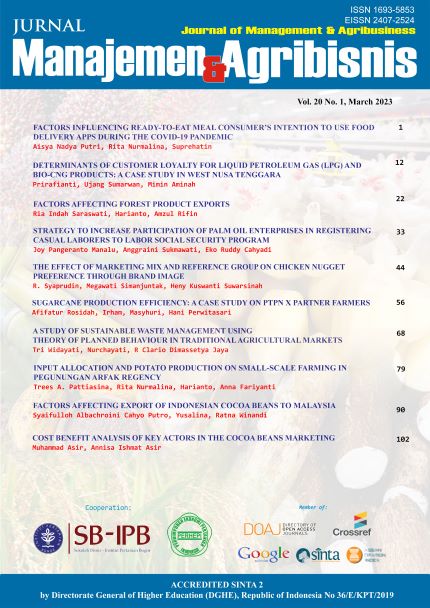Sugarcane Production Efficiency: A Case Study on PTPN X Partner Farmers
Abstract
The low production and productivity of sugarcane is a problem for the sugar industry in Indonesia, while the demand for sugar increases yearly. One of the efforts to increase sugarcane productivity is improving the efficiency of sugarcane farming. Appropriate farming efficiency and identification of inefficient resources can increase farming productivity. PTPN X, as a company engaged in the sugarcane plantation and sugar industry, obtains most raw materials from partner farmers. This study aimed 1) to determine the technical, allocative, and economic efficiency of sugarcane farming and 2) to analyze the managerial characteristics of farmers that affect the technical inefficiency of sugarcane farming. This study uses the stochastic frontier Cobb-Douglas production function approach and the dual frontier cost function. The results show that the average level of sugarcane farming's technical, allocative, and economic efficiency are 0.762; 1.315; and 0.976, respectively. The average level shows that sugarcane farming has been technical, allocative, and economically efficient. Farmers' managerial characteristic that affects technical inefficiency is the farmer's education level. The study suggests reducing the effect of inefficiency by taking higher education. Farmers with a low technical efficiency value can adopt the use of inputs by farmers with a higher value.
Keywords: technical efficiency, allocative, economic, sugarcane
Authors
Authors who publish with this journal agree to the following terms:
- Authors retain copyright and grant the journal right of first publication with the work simultaneously licensed under a Creative Commons Attribution License that allows others to share the work with an acknowledgement of the work's authorship and initial publication in this journal.
- Authors are able to enter into separate, additional contractual arrangements for the non-exclusive distribution of the journal's published version of the work (e.g., post it to an institutional repository or publish it in a book), with an acknowledgement of its initial publication in this journal.
- Authors are permitted and encouraged to post their work online (e.g., in institutional repositories or on their website) prior to and during the submission process, as it can lead to productive exchanges, as well as earlier and greater citation of published work (See The Effect of Open Access).

